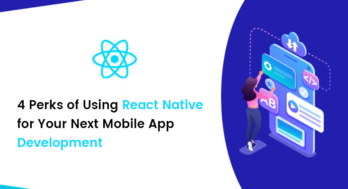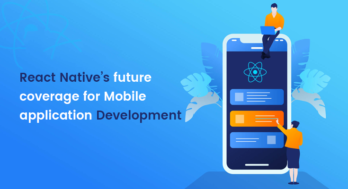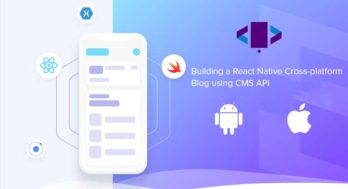The rising popularity and enhanced use of the framework, directly proportionated with the growth of mobile apps which were either rewritten or partially written in React Native.
The advent of a new technology earns all the buzz by showcasing its differential side where not all can manage to maintain the same level of acceptance; however, React Native proved to be ingenious.
Now, How does that happen?
Simply put, the robust framework allowed a user to write code in a single language (JavaScript) which can further be ported to multiple platforms for execution.
On the flip, if compared traditionally, two separate apps were developed using different languages to make them run smoothly on iOS and Android smartphones, which added to their limitations.
A Few React Native’s Educational Insights
React Native allows us to render applications for iOS and Android while writing real, native and indigenous program codes. Let’s explore some more about this robust platform.
1. A workable platform for writing responsive and natively rendering mobile applications for Windows, Android, and iOS and is readily available to develop cross-platform mobile applications.
2. React native uses a connective link to translate JavaScript codes to the target device’s machine language.
3. It uses the same standard UI building blocks as regular iOS and Android apps and makes it a mobile framework that compiles and runs app components for native apps in JavaScript.
4. The use of JavaScript for React Native enables developers to deliver fast and efficient mobility solutions for both web and mobile apps.
5. With its usage and fruitful results, React Native has gained nimble adoption by many big and small businesses catering to different sizes and industries. Facebook, Bloomberg Instagram, Tesla, Skype, Airbnb, Walmart, to name a few.
6. React Native gives all the benefits of a native application where it makes use of its native components that compile codes to the device’s own machine language.
7It can help you accelerate your development times. It is made portable enough to interface with third-party plugins to use a system’s own internal features and functionalities.
Why React Native Holds a Strong Stand in the Open Source Community?
A principle true for React Native Development:
“Learn Once, Write Anywhere!”
A good mobile developer always looks for ways through which he can optimize his codes to deliver seamless results. The web market, today, contains a pool of efficient tools, platforms, languages, and frameworks for mobile app development but it can be hard to figure out which is the best one and is here to stay for long.
Well, if you have a mobile app project onboard and are sorting frameworks to initiate the project then look for React Native App Development which is a cross-platform framework more stable and robust than the others in the line.
Without any dilemma it can be said that React Native is a feasible and flexible solution for all types of mobile applications, serving their distinct requirements. To prove my assertion let’s take a tour of the Big Benefits of React Native for Mobile App Development:
# Performance:
When compared with the hybrid solutions, the performance delivered by React Native apps is extensible and nimble, transforming the overall feel of the applications in the context of user experience and running of the app.
When compared to native, levels are the same or sometimes exceed in performance. Genuinely, applications written in React Native render equal or even superior performance to those written in native.
# Time-to-Market:
React Native holds the capability to be enormously fast. The initial phase of app development with React Native is driven swiftly where the developing add-on features can also be made quick.
For mobile app projects with restricted deadlines, it’s feasible to deploy react native developers on the same as you get full control over the app release and launch wherein both platforms can be released on the same day, same time without any hassles.
# Code-sharing
Code-sharing simply adheres to the presentation code (front-end code) which can be smoothly shared both between iOS and Android. The business logic can also be shared with web applications with a provision of plenty of code-reusability across platforms.
Further, the developed apps can be hosted on our own server, practicing over-the-air updates consistently without the need for app-store approval.
# Cross-Platform
React Native has earned its fame being renowned as a cross-platform framework as it allows for simultaneous development on iOS and Android by the same team, with a handful of native component API’s as well. This aids you with cost-cutting on labor nearly to half.
With the help of shared data layers in the framework, it makes it easy to manage and track changes in the application state. One data layer is written and made public for both iOS and Android platforms, minimizing the chances of failure.
# Productivity
React Native apps show enhanced productivity where 95% of the code is shared between iOS and Android. Code reusability and quick results from the feedback cycle help programmers to iterate designs as per changes without needing much of time. The requirement of knowledge sharing is made negligible, as each feature is implemented by one team;
# Deployment
Quick bug fixes over-the-air simply means the framework’s JavaScript bundle will be solely hosted on the server which can be directly retrieved and accessed by the client; similar to how it works on web development.
# Developer Experience
React Native developers while experimenting with the robust framework experience ease at work while coding with the quick feedback delivered in the form of results.
They don’t have to restart their packager to see all the little changes during the development phase. It saves valuable time for programmers where they are not required to re-build and deploy mobile apps in order to preview a one-line UI change.
Final Words
Making a headstart with React Native, it’s better to consider all its merits which may help you make the right choice in selecting it over others. Nevertheless; one must not forget to map his/her app requirements with this potential framework to achieve fruitful results.
For mobile app development, if you pick React Native to proceed with, then surely you haven’t made a regretful choice as it is known to deliver results beyond the expectations.
Happy Coding!



